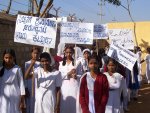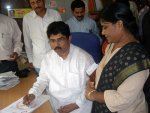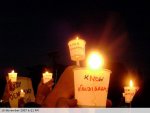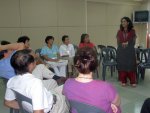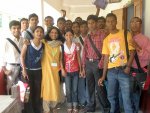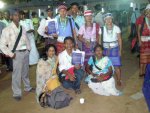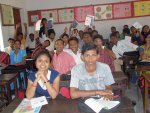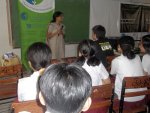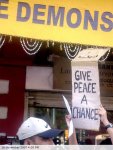
2007 – A step Beyond the Indian Soil - Journey of Charter
par Sudha REDDY
I. Indian Schools and the CHR
Children’s Charter and cultural exchanges
The Indian Charter team, in collaboration with The Activity, an edutainment company, successfully facilitated over a six-month-long process the drafting, by children, of the Indian Children’s Charter of Social and Environmental Responsibilities. The process included 133,300 students 8 to 16 years old at the start of a “WIZ kids” competition. The Activity’s involvement also brought in the corporate sector.
As a part of an India-Philippines cultural exchange program, four winning WIZ-kids teams made a memorable trip to Philippines. Upon returning from Manila, the children shared their reflections in the form of essays and a letter to the President of India in May 2007 about the Charter of Human Responsibilities.
Brazil’s Charter facilitation team has agreed to host the young winners in Brazil in 2008.
Campaigns and conventions
The Activity integrated the Charter into life-skill education for 10,000 lower-middle-class and poor students. In December 2007, the “Akshaya Life Skills” team organized an awareness campaign, the ‘Road Show’ by 433 students and teachers from local government schools, primarily catering to the Muslim population located in a poor and sensitive area of Bangalore.
Inspired by the encompassing nature of responsibility, the Activ8 Foundation, with more than one million active youth members, is keen on using the CHR as guidelines for its Eradicate Poverty campaign.
In association with the Activ8 Foundation, the CHR was introduced in the convention of the Indian Catholic Youth Movement in Cuttack, Orissa, in October 2007, where about 2,000 young people from all over India gathered to celebrate unity in diversity and discuss several social issues from a secular perspective. The challenge was to raise critical thinking about the notion of responsibility.
The CHR at the university
“Responsibilities of youth, teachers and relevance of the CHR” was the theme discussed in an interactive session organized by the political science faculty of Gulbarga University in June 2007. In December 2007, one-day seminar on “Globalization, Cosmopolitanism and Culture” was organized by the Indian Academy of Business in Bangalore. The CHR was a reference in their discussions on ethical and social responsibilities of business entrepreneurs and civil society.
In April 2008, in association with the Center of Gandhian Studies of Bangalore University, we intend to conduct a three-day South Asian workshop on “Uniting in Responsibilities in a Culture of Rights - Locating Possibilities,” including academics, spiritual leaders, lawyers, peace and human rights activists, local-community leaders, and intellectuals. The workshop will be drawing up an Indian Charter of Human Responsibilities. See full report here.
II - Indian Legal Professionals and the CHR
As a result of networking with the initiative of Mr. Ramjan Darga, one of the Indian CHR team members, four meetings were held with Indian Lawyers Association, Hyderabad Karnataka Chapter in Gulbarga with regard to CHR. Two seminars at Gulbarga were held on fundamental rights and Right to Information. Nearly 500 Advocates attended and shared their views on the responsibilities of lawyers and judges.
A planning meeting was held for holding a joint seminar on Public Interest Litigation and Human Responsibilities in 2008.
See full report here.
III - NGOs, Movements, and the CHR
Greenpeace India has found the relevance of CHR in its objectives and actions. The Charter principles pamphlets are being distributed along with Green Peace campaign documents in educational institutions, to eminent personalities, policy makers, politicians in all major cities of India.
Around 30 Civil Society Organizations and many individuals took the collective responsibility to call for a Civil Society Summit in Ambedkar Bhavan, Bangalore from August 24 to 26, 2006 on the occasion of the 60th Anniversary of India’s freedom from the British rule. The Summit, which was attended by about 700 participants from across the country and outside of India. A Souvenir with people’s Charters including CHR will be released soon and be distributed to all participants.
Ektaparishad, a national Gandhian mass movement for land and livelihood and a strong supporter of CHR, believes that the culture of nonviolent resistance over culture of violent oppression and injustice is a moral and social responsibility of all responsible citizens. It mobilized masses for a 28-day Nonviolent Civil Disobedience Campaign in India, a march which ended with 25,000 people reaching Delhi. The prime minister was forced to yield to their demands.
Nandigram in West Bengal, India has become the hub of cold-blooded clashes on account of evicting locals in accommodating a Special Economic Zone. A massacre was perpetrated in January 2007. To protest against this act of barbarity, artists, young people from various sectors came together in November 2007 to answer the performance of brutality through the performance of creativity. One of the later events on the same day organized by Dr. Dinesh of Indian CHR team was to raise awareness for high-tech urban savvy people. Passersby were engaged in conversations on their responsibility as citizens to be aware of the violation of rights of farmers & common people.
The CHR has been distributed to the staff of Actionaid, India.
As an ongoing activity, the CHR is being used as a strategic approach in democratic leadership trainings for many grassroots-community women by 10 NGOs in Karnataka and Andhra Pradesh states.
See full report here.
IV - The CHR and Environmental Education
A one-day training session was held on December 15, 2007, on “Environmental education in the schools” was held for 85 teachers from 35 schools in Chittoor district of Andhra Pradesh in collaboration with the NGO Sahajeevan. The teachers agreed on the urgency of imparting environmental education to students through scientific experiment and through community projects. They also formulated the Charter of Professional Responsibilities, which they carried with themselves to display at homes and schools.
The Environment & Responsibility program in the schools is feasible in India. We are emphasizing a similar process as that carried out in Brazil with the state. Preliminary discussions on introducing Environmental Education in the State schools based on the Brazilian model took place with the Deputy Chairman of Karnataka State planning Commission. Activ8 Foundation, a youth NGO based in Delhi is keen on introducing Brazilian model in about 500 schools across the country. Discussions for strategic planning and funds before actual implementation of the program are in progress.
See full report here.
V - The CHR beyond India
Networking
Sri Lanka
Sudha travelled to Sri Lanka with John Stewart in February 2007 to present the Charter. Dr. Nalin Swaris in Colombo was instrumental in contacting the right persons and institutions. We shared the CHR with the Institute of Human Rights, Lawyers for Rights and Development, Sarvodaya, the Centre for Environmental & Nature Studies and Ecumenical Institute For Study and Dialogue. The Institute of Human Rights discussed with the president of the BAR Association, Mr. Nihal Jayamanne, the possibility of advancing the ideas of the CHR within a legal framework. The trip yielded the following results : the CHR was later discussed at a human rights forum on rights and responsibilities, conducted by the Human Rights Institute in Sri Lanka ; Sarvodaya has offered to translate the CHR into Sinhalese ; a series of discussions on the CHR are taking place among motivated young social researchers group in Sri Lanka.
Pakistan
A network of NGOs in Pakistan, involved with indigenous communities have appreciated the relevance of the CHR and implanting it in their ongoing activities. The CHR was disseminated among several Human Rights activists and individuals.
South Asia Peace Alliance
South Asia Peace Alliance (SAPA) is a peace network that has its core group organizations in India, Pakistan, Nepal, Bangladesh, Sri Lanka and Afghanistan. In August 2007, Sudha presented the CHR and disseminated it among the core group at a meeting held in Gwalior, in Northern India. The dialogue has paved the way for further incorporating the CHR in SAPA’s future activities and for a potential collaboration.
Japan
In March 2007 Sudha shared the CHR with Prof. John Clammer, a sociologist in the UN University, Tokyo. He is willing to launch the CHR in Japan and Korea with the coordination of Asian Charter facilitation teams. In association with UN University of Japan, a potential workshop/ seminar at an Asian level on “Responsibilities and Ethical Values in a Globalized World” is being considered.
India-China Youth Cultural Exchange
The CHR as a basis for an India-China Youth Charter was presented in an interactive session among visiting young Chinese, professors and Indian youth in the India-China Youth Cultural Exchange program in Bangalore in August 2007.
International Conferences
An Economy in the Service of Society
In December 2006, the CHR was shared among the academicians and activists.
Asia Forum for Solidarity Economy
The experience of using the CHR as a means to strengthen grassroots-community women in their empowerment process was shared through a presentation by Sudha in Manila in October 2007. Solidarity economy based on ethical and social responsibility was discussed at length. The forum has paved way to potential networking for CHR promotion in Nepal, Bangladesh and Japan.
Films on Environment in the schools
Sudha was the part of the Charter Facilitation Committee of Philippines in screening the films on Environment in the schools in Manila, Philippines, in October 2007.
South Asian Dialogues on Ecological Democracy
In Mumbai, in December 2007, about 40 activists, NGOs, researchers, media persons, and politicians from South Asia met for 4 days and discussed the relation between ecology, politics, and society. The Charter of Human Responsibilities was disseminated among the participants. A consensus was reached to form a network at the regional level.
See full report here.
VI - The Media, Eminent Personalities, and the CHR
While participating in Regional Media Workshop on Nonviolent Transformation, I shared views on responsible media, and the CHR was distributed among about 40 journalists from South Asian countries. The Group Editor of “Dainik Bhaskar”, with more than a million readers, has proposed to bring out the CHR in their publications. Apart from these journalists, several individual journalists have been contacted with the CHR.
The following personalities have decided to include the CHR in their work and dissemination processes : Swami Agnivesh, President of International Arya Samaj, highly respected social activist ; Dr. Chiranjiv Singh, a highly respected former Chief Secretary of Karnataka Government and worked in UNESCO ; Mr.Vijay Pratap, a well-known social Activist, intellectual, writer ; Dr. Marulasiddaiah, retired professor of social work in Bangalore University ; Justice V.S. Malimath, former Supreme Court judge, member of Human Rights commission ; Justice Nagmohan Das, a well known senior judge ; Dr. C.S. Dwarakanath, Human rights advocate and the chairman of Backward Castes Commission ; Mr. John Samuel of Action aid International based in Bangkok.
See full report here.

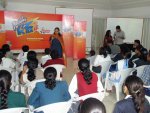
Groupe de travail sur la Charte lors des Wiz Kids
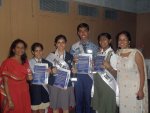
Equipe de soutien pour la Charte lors des Wiz Kids
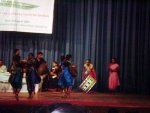
60 ans : une démocracie mûre, une société civile responsable
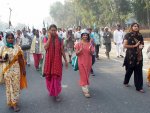
Marche pour les droits terriens

Marche solidaire pour la paix à Bangalore
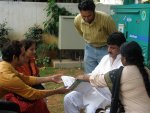
Politicien en train de signer la campagne ’Ban the Bulb’
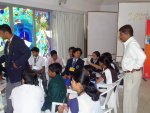
Groupe en discussion lors du groupe de travail sur les médias et la Charte

